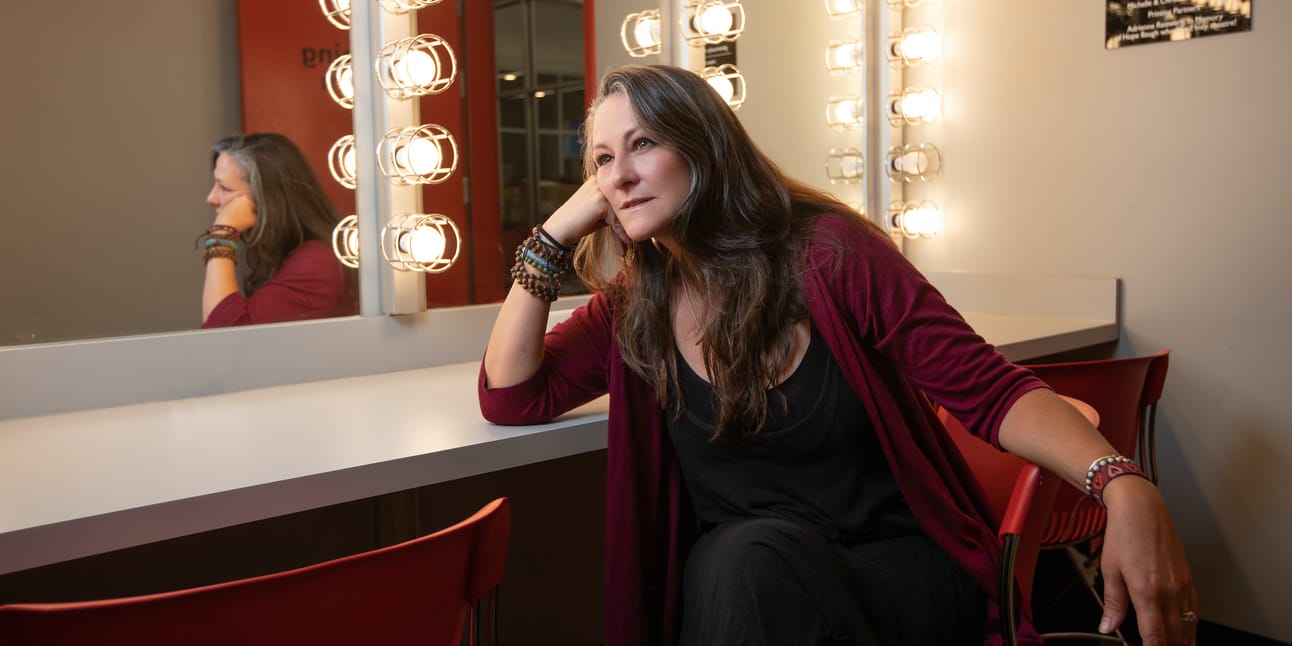
This cover story is presented by Life in Indy. From exploring Indy’s top attractions to connecting with leading employers, Life in Indy is the go-to resource on all things central Indiana. Visit the Life in Indy website for a virtual tour experience and explore our community!
Be Here Now: Actor Jen Johansen on Staying Present on Stage

It starts like this: in late June our team rolls up to the Phoenix Theatre Cultural Centre for an interview with Indy-based, professional actor Jen Johansen. Summer thunder is right on our heels. Schedules are tight, and we all need this particular window to work–rain or shine.
Next thing I know, Johansen and I are sitting cross-legged in the middle of the lobby, talking about our trips to Watkins Glen State Park in New York. For me, it’s like we’ve known each other for a lifetime, and it’s like Johansen’s physical presence is an invitation to settle into now, this exact moment. Nowhere else to be but right here on this impossibly bright red bench.
With a severe storm watch in effect, Polina taking pictures, and Natasha recording BTS, Johansen and I begin the interview.

Design by Lindsay Hadley
Jenny Walton: Alright, let’s start with the obvious one. In a world of staying home and access to infinite streamable content, why do you love and believe in live performances?
Jen Johansen: Because living and breathing in a room with people who are sharing stories is not like anything else that you can get on a screen. The reason that I really love theater is the gift of taking the journey from beginning to end. The shared experience of everyone holding their breath, or everyone laughing and getting that collective release. It’s like nothing else.
JW: With that in mind, what do you think about Indy’s theater scene?
JJ: We’re poised in a really beautiful place right now, and I think Indianapolis should be excited about what’s being created here. This is a very special time in the city, culturally speaking, with so many organizational leaders stepping away from their posts after 30-40 years.
There are some really beautiful changes coming and more voices are being represented. You can sense the community wanting to lift each other up. I think that makes for better communication and for better art in the world, you know. So I’m excited about what’s happening for Indy–especially here at the Phoenix Cultural Center.
JW: That’s good to hear, and I’m excited to see how it plays out. As you know, we’re here today to talk about focus and what it means for you as an actor. I’m curious to know what that word calls to mind for you.
JJ: In a way, it’s hilarious we’re talking about focus because I actually have attention deficit disorder, so it makes me laugh. But focus makes me think about attention. I think about energy. About specificity. The beauty of live theater is that it is imperfect. It changes because the audience becomes that additional character, and the audience is different every time.
When you’re doing a comedy, you get a lot of markers: here’s the big laugh, here’s another little laugh. And you can land those things, and trust that they’re building momentum and energizing the room.
And then there are the times when someone in the audience laughs at a line we didn’t anticipate would be funny or somebody drops a line. Those are moments that ask for you to be completely present. Energy follows attention.
If I’m in a scene with you and my eyes start to wander over your shoulder, that’s going to dramatically change what we’re creating together. If I’m on stage with another actor and there’s a distraction from the audience, we deal with it by sort of lasering into each other to preserve that sense of focus, to stay present.
Also, I will say preparation is what sets you up to navigate. I’m specifically talking about the moment when you’re on stage in production. If you’ve done your work, learned your words, really know your character, then you have to trust that any mistake you make is authentic to the performance.
The audience doesn’t know. They’re not reading from the script. You have to trust that you will know what to do authentically as that character because that’s who you are at that moment. That is very freeing. When you’ve done the work, that effort is always going to be there to support you.

JW: That makes a lot of sense. You talked about this a little bit already, but is there more to how you balance the need for total focus while staying open to the spontaneity inherent in a live performance?
JJ: I learn my words. I learn about what this person wants. I learn about what’s not on the page. If I’ve done my work to create that whole world, then that is going to support me no matter what. It took me a while to really know that or to trust that in myself.
JW: Are there any particular habits or rituals that you find help you focus when you are trying to sink into a character?
JJ: When I’m approaching creating a character, I’m very thoughtful about their bodies. How they breathe or where they carry tension or what they do with their hands. So I find the breath to be the real grounding point of it. Even when you’re portraying someone who’s agitated, you, the instrument, cannot be agitated–you have to be able to find and hold that tension. And it really is about breathwork.
Even though I’ve been doing this for a while, sometimes it’s hard to combat those nerves right out of the gate. So, often just before going on stage, I’ll do deliberate breathwork to get myself grounded. But it also works on stage, you can give yourself permission to reset at any moment.
There are so many things about live performance that call you to be present and that will continually call you to come back to the present moment. If you lose your grip on the moment–maybe you screwed up a line or maybe you’re patting yourself on the pack about how well you’re doing–you will mess the next thing up. That call to be here now is such a gift.
JW: Where do you see the most crossover with your own life off the stage?
JJ: I think there is constant crossover between the world I inhabit professionally and the world that I live in as a person. I’m fortunate to make my profession as an actor, but I’m also an artist so that’s the way I’m going to interact with the world. Whether I’m being paid to be on stage or not, the crossover is there for infinite.
I was already working as a professional actor when I found yoga, but it’s the best. It’s been really, really useful for me. It has definitely helped me actually be in my body. This body is my instrument, and I have to work to keep it sharp. But I think the most important thing to know is that I cannot really bring a character to life on stage if I’m not living a life of my own.
JW: Man, I could talk to you about that all day, but we’ve got to wrap up for now. What would you like to share with other creatives here in Indy?
JJ: Keep talking to each other. Stay curious. Ask for help, and lift each other up.

The interview concludes. We pile our equipment back into Polina’s car and return to The Stutz. As if on cue, the wind lets loose and the clouds burst just as we close our office door behind us.
Stay Connected

PATTERN is a 501(c)(3) public charity. Your donations make our work possible.
Subscribe to our Print Magazine and support creatives across the state.
Love our work? Hire us! We’re obsessed with storytelling and design. Email [email protected] with details for a quote.
This story was made possible thanks to the generous support of our friends at Life in Indy.

